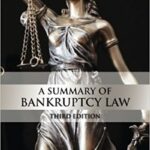
ProPublica’s study of the percentage of black debtors who file bankruptcy and fail at Chapter 13 misses the forest for the trees.
The report contends that bankruptcy lawyers steer blacks to an inappropriate chapter for the benefit of the lawyers.
In Memphis, an entrenched legal culture has made bankruptcy a boon for attorneys while miring clients… in a cycle of futility. The Atlantic
From half a continent away and from an utterly different racial neighborhood, my professional reaction as a consumer bankruptcy specialist is not bloody likely.
I can’t rule out some venial or shortsighted lawyers at work, but systemic issues are far more likely culprits than racial bias for the reported results.
Chapter 13 is tough for everyone
Nationally, two out of three Chapter 13 cases fail. A high rate of unsuccessful Chapter 13’s is predictable.
You start with economically fragile families. Add a slice of debts that must be paid through the plan. Stir in the upsets and vagaries of real life, and it’s unlikely that any troubled family’s financial life will be stable over the 3 to 5 years necessary to complete the plan and get to discharge.
Bankruptcy lawyers lose when cases are dismissed
A bankruptcy lawyer who does a “no money down” Chapter 13 is himself gambling that the client can succeed in the case so that the legal fees are paid. The odds are not good. See above.
Counting on filing Chapter 13’s to make a good living is risky at best; counting on profiting from unsuccessful cases courts a bankruptcy filing for the lawyer.
Bankruptcy law discourages Chapter 7
For starters, in bankruptcy “reform”, Congress tried to push consumers to Chapter 13, arguing that debtors should take “personal responsibility” for their debts. Chapter 7 was disfavored.
The law makes it risky and uncertain for a bankruptcy lawyer to file a Chapter 7 without payment of the fees in full, before filing. Not to mention the fact that for lawyers who offer some version of a post bankruptcy payment plan for fees, it doesn’t always work out well. Even with a Chapter 7 discharge in their pocket, paying their lawyer later for that benefit seems to lose urgency over time.
Trust me, I’ve seen that personally too often to be tempted to file without full payment.
Southern states have comparatively paltry exemption systems, so the fear of losing even ordinary possessions in Chapter 7 makes Chapter 13 seem preferable.
The poor have no excess income
To be eligible for Chapter 13, a debtor must have a regular income sufficient to pay current living expenses and have enough left over every month to fund a repayment plan.
The poor simply don’t have incomes that are realistically able to sustain plan payments.
The fix
The tangential fixes are obvious: more generous exemption systems and lawyer compensation that doesn’t require payment in full up front to file Chapter 7.
Or, simplify Chapter 7’s such that a lawyer wasn’t a necessity. Bankruptcy “reform” effectively scuttled any chance that an average Joe could represent himself. Way to go, Congress.
But we have to face the fact that the wave of desperately poor people in bankruptcy is an economic problem, not a legal problem. Until a greater slice of our population has an adequate and reliable income, and a safety net without holes, the financially strapped will use bankruptcy to stay afloat a little bit longer.
Alternative views
I am admittedly opining from a far distance from Memphis, Tennessee. Maybe my colleagues from the South see this situation differently. What say you?








Totally agree, Cathy. I was going to post a commentary on this study, but your’s conveys my sentiments exactly ! … and I practice bankruptcy law on the edge of the South !
I disagree with your disagreement. Cathy, I know you are an excellent and ethical attorney, which is why you can’t fathom how differential steering of clients into inappropriate chapter choice could happen on a large scale. Also, the racial disparities in Mountain View and surrounding areas, while I’m sure they exist, are nowhere near what they are in the Memphis area, or in Chicago, where there is a similar situation..
Yes, some of the disparity is because of inequality in income, discrimination in the extension of credit, and other factors that are present when a potential client living in a mainly African American neighborhood beings to think about filing bankruptcy, But that’s not the only reason.
Professors Jean Braucher, Robert Lawless and colleagues published a study that showed marked, probably unconscious, bias in a randomized, nationwide sample of bankruptcy attorneys. https://papers.ssrn.com/sol3/papers.cfm?abstract_id=1989039.
“The second study reports on an experimental vignette sent to a random
sample of consumer bankruptcy attorneys who represented debtors. The
attorneys were more likely to recommend chapter 13 when the hypothetical
debtors were a couple named “Reggie & Latisha,” who attended an
African Methodist Episcopal Church, as compared to a couple named “Todd
& Allison,” who attended a United Methodist Church. Also, attorneys
viewed “Reggie & Latisha” as having better values and being more
competent when they expressed a preference for chapter 13 as compared to
“Todd & Allison,” who were seen as having better values and being
more competent when they wanted to file chapter 7, giving them a “fresh
start.” Previous research and the results from the present experimental
vignette study suggest consumer bankruptcy attorneys may be playing a
very important, although likely unintentional, role in creating the
racial disparity in chapter choice. Together, the two studies raise
questions about the fairness of the bankruptcy system.”
David Yen
Northern District of Illinois.
As I read the ProPublica argument, the claim is that bankruptcy lawyers are steering blacks to Chapter 13, despite the unlikelihood that it will succeed, for the benefit of the lawyers. That’s the piece I find improbable. Most of the lawyer’s work in a bankruptcy case is done before filing. With a no-money-down 13, the lawyer gambles more than the debtor that the case succeeds.
Further, I don’t see what the alternative is for a client without money, with their utilities turned off or their car in danger of repossession. Unless a lawyer is willing to do a Chapter 7 for free, 13 seems the better of poor choices.
Additionally, when I’m in court, the Judge always asks how many prior 7s or 13s were filed. Most chapter 13 filers seem to have a prior chapter 7 within 8 years (remember when pre-2005 it was only 6 years?) and they must file chapter 13 to receive any bankruptcy relief.